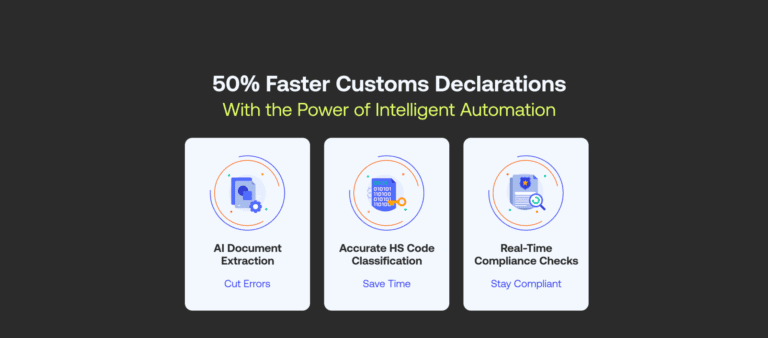Sort your ICS2 declarations in 90 seconds with AI
The High Cost of Small Errors in Trade Compliance
- John Hall
- Customs Specialist at iCustoms.ai
Imagine this: your shipment is stuck at the border because of a mislabelled HS code.
Days turn into weeks, your customer gets unsatisfied, and the penalties start piling up. All because of one small mistake. Trade compliance might seem like just paperwork, but in reality, even the tiniest error can spiral into major financial and reputational damage.
Below, we break down the most common compliance mistakes that are quietly costing businesses time and money.
Common errors in trade compliance
Businesses engaged in global trading often make these trade compliance mistakes.
1. Misclassification of goods
What’s the error?
Entering wrong Harmonised System (HS) codes or mis-declaring a product’s nature, especially for dual-use items requiring export licences.
Why it matters:
Customs duty values and regulatory control hinge on classification. An inaccurate HS code can trigger audits or result in duty underpayments, leading to penalties that can be 0.5 to 8 times the value of the duty loss. For non-dutiable items, fines can range from 20-80% of the goods’ value.
Consequences:
- Significant duties or fines
- Audits that slow shipments and drain staff resources
- Lost eligibility for trade agreements or preferential rates if misclassification violates origin rules
2. Incorrect valuation and omitted costs
What’s the error?
Many importers unknowingly declare an inaccurate customs value by leaving out key cost components, like packing, freight, or insurance. Click here to learn the 6 valuation methods in the UK.
Why it matters:
Customs authorities require a precise and complete valuation to assess duties and taxes accurately. Under-declaring value, even unintentionally, is seen as non-compliance and can trigger audits or investigations. On the other side, over-declaring can inflate your duty payments and make your product less competitive in the market.
Consequences:
- Duty penalties based on underdeclared value
- Increased audits and delayed clearance
Unnecessary duty overpayments affecting profitability
3. Screening failures with sanctioned entities or denied parties
What’s the error?
Failing to screen all parties against denied or restricted lists before shipment can result in serious compliance violations.
Why it matters:
Failure to comply with denied-party screening regulations can result in significant financial and reputational damage. Agencies like OFAC and BIS are increasing fines and publicly calling out violators.
Consequences:
- Heavy penalties and fines
- Loss of export privileges or license suspension
- Brand damage from enforcement publicity, even if unintended
4. Inaccurate or missing documents
What’s the error?
Missing details or errors in packing lists, invoices, certificates of origin, or customs declaration forms.
Why it matters:
Documents are the first line of defence in compliance and audits. Any inconsistency triggers red flags.
Consequences:
- Certification errors can lead to full denial of duty-free treatment
- Customs holds and inspections delay shipments
- Penalties and fines
- Legal investigations or loss of trading privileges if repeated
5. Rules-of-origin and certificate of origin errors
What’s the error?
Incorrect or incomplete Certificates of Origin cause customs to refuse preferential tariff treatment.
Why it matters:
Under agreements like USMCA or EU FTAs, small errors invalidate duty-free access, shifting full duty to importers.
Consequences:
- Loss of tariff benefits worth thousands per shipment
- Fines, delays, and legal complications
- Damage to business credibility when origin proofs fail
6. Licensing and export controls slip-ups
What’s the error?
Shipping controlled or dual-use items without the proper export license or misunderstanding regulations like the EAR (Export Administration Regulations).
Why it matters:
Export controls are evolving fast. New rules like MEU (Military End User), MIEU, and ownership-based sanctions make compliance more complex. Even an unintentional mistake can lead to serious violations.
Consequences:
- Civil and criminal penalties
- Many firms face hefty fines even from unintentional misinterpretation
7. Data integrity and reporting errors
What’s the error?
Submitting customs or tax filings with missing data, formatting issues, or misreporting key details.
Why it matters:
Authorities rely on clean, accurate data. If your submissions are incomplete or invalid, they’ll likely be rejected, and repeated errors raise red flags. That can lead to audits, fines, and even damaged trust with regulators.
Consequences:
- Rejected filings and delays in customs clearance
- Fines for repeated reporting mistakes
- Compliance breaches that put your reputation at risk
8. Failing to update trade compliance software or systems
What’s the error?
Relying on outdated software or manual processes for compliance checks, HS lookups, valuation, or record-keeping.
Why it matters:
Regulatory requirements evolve constantly. If your systems aren’t aligned with the latest customs rules (like CDS replacing CHIEF in the UK or ICS2 in the EU), errors are almost inevitable.
Consequences:
- Non-compliant declarations
- Loss of automation benefits
- Expensive rework and human error risks
9. Poor recordkeeping and audit trail management
What’s the error?
Failure to store customs-related records for the required statutory period (duration depends on jurisdiction).
Why it matters:
During audits or investigations, regulators expect full traceability of transactions, declarations, and licensing.
Consequences:
- Fines for non-compliance
- Potential denial of trusted trader schemes
- Legal action in serious cases
10. Inadequate staff training and role clarity
What’s the error?
Assuming your logistics or operations team fully understands evolving compliance rules and assigning compliance tasks without proper accountability.
Why it matters:
Compliance is complex. Without ongoing training and clear responsibility, it’s easy for teams to miss key updates or misinterpret rules.
Consequences:
- Increased compliance gaps
- Internal confusion and mistakes
- Personal liability risks in some jurisdictions
The sheer volume of these potential errors shows that manual compliance is not just inefficient—it’s a significant business risk. The key to mitigating this risk is not just to fix mistakes, but to prevent them from happening in the first place.
Wrapping up
Often overlooked, small trade compliance errors, such as a misclassified product or a missing document, may together lead to costly penalties, audits, and shipment delays.
That’s where iCustoms comes in.
Our intelligent trade compliance solutions are built to spot and prevent these costly errors before they happen. Whether it’s automated HS code classification, denied party screening, real-time valuation checks, or seamless documentation management, iCustoms uses advanced AI and rule-based engines to ensure every declaration is accurate, compliant, and audit-ready.
You may also like:
Simplify Customs with our Powerful Customs Management Software
Automate declarations, track shipments, & ensure compliance.
About iCustoms
iCustoms is an all-in-one solution helping businesses automate customs processes more efficiently. With AI-powered and machine-learning capabilities, iCustoms is designed to streamline your all customs procedures in a few minutes, cut additional costs and save time.
Simplify Customs with our Powerful Customs Management Software
Automate declarations, track shipments, & ensure compliance.





